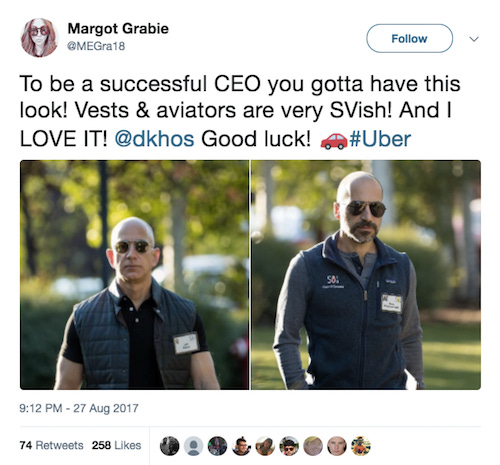Uber’s surprise CEO pick, SoftBank’s billion-dollar investments, secret self-driving car tests
LXXII
Chief executives.
Do you think Uber’s board timed its high-drama conclusion of Uber’s next top CEOto the season finale of Game of Thrones? It sounds crazy, but this is Uber, and far crazier things have happened in the last six months, nay, the last two weeks. It was only 10 days ago that everyone was sure Uber’s next CEO was Jeff Immelt, and only last week when Hewlett Packard Enterprise’s Meg Whitman reappeared in the discussions. As Uber’s board convened this weekend, Immelt was said to have presented his vision for the company but so was Whitman. Certainty faded to uncertainly until Sunday morning when Immelt withdrew from contention and suddenly all became clear again, it was Whitman! Immelt never really had the votes and Whitman, despite her emphatic tweets to the contrary, would be the next CEO of Uber. Everyone knew, everyone was sure, everyone was prepared to hear her name when white smoke went up from the Uber boardroom late on Sunday and news broke that the inheritor of the Uber throne would be… Dara Khosrowshahi.
Khosrowshahi the dark horse, Khosrowshahi the “truce” candidate, Khosrowshahi the compromise. Most media reports had noted that there was a third top candidate along with Whitman and Immelt, but the inability of any reporter to surface a name had led to half-joking, half-serious speculation that the final contender was none other than Uber co-founder and ousted CEO Travis Kalanick. Instead it was Khosrowshahi, the current chief executive of online travel giant Expedia.
It feels like a lot of people got played, the question is by whom. According to media reports, Kalanick had thrown his weight behind Immelt while Benchmark, the investor that’s suing Kalanick and Uber, was pushing for Whitman. Arianna Huffington, a close Kalanick confidante, “came around” to supporting Whitman. On Sunday, the board was reportedly leaning toward Whitman until lunchtime, after which Khosrowshahi gathered support as a “safer” candidate. What happened after lunch? Again, this is Uber, and anything seems possible. Maybe the Kalanick camp, which was pushing Immelt’s name hard in the press, had actually wanted Khosrowshahi all along—Kalanick was said to have been involved in recruiting him early in the search process. Or maybe the board got cold feet on Whitman after she reportedly requested that Kalanick’s role be limited to a non-executive board member with little operational involvement. In a rare interview with the Financial Times, Whitman said yesterday that she only even reentered the CEO running on Friday, when Uber’s board directors “asked what it would take for me to change my mind.”
Uber desperately needs a fresh start; perhaps they will get it in the candidate that, in the end, came saddled with the least baggage. Khosrowshahi’s appointment surely came with its own politicking but unlike Whitman and Immelt, those dealings haven’t already widely circulated in the press. At a company whose many scandals are constantly being leaked and chronicled, that’s already a small win.
Vests & aviators.
Uber might be a little nonplussed by the Khosrowshahi announcement, but Expedia is upset to see him go. “If Dara does leave us, it will be to my great regret but also my blessing,” Expedia chairman Barry Dillar wrote in a memo to employees on Monday. “He’s devoted 12 great years to building this Company and if this is what he wants for his next adventure it will be with my best wishes.” The stock yesterday tumbled 4.5%.
Khosrowshahi brings an interesting profile to Uber: an Iranian immigrant whose family fled to the US in 1978, he is a proven dealmaker, has run Expedia since 2005, was the highest paid CEO in the US in 2015, and is an outspoken critic of US president Donald Trump. He attended Brown, then started in investment banking at Allen & Co. before joining billionaire Dillar at IAC, the media conglomerate that acquired Expedia in 2001. He has been known to pull off the certified Jeff Bezos badass look.
Like Uber, Khosrowshahi is no stranger to thin margins and fierce competition. In the early 2000s, Expedia was unseated by Booking.com, a rival online travel site that let hotels set commission as low as 12%, compared to the 25% fee charged by Expedia. Priceline bought Booking.com in 2005 and proceeded to turn it into the largest hotel-booking site in the world. IAC spun out Expedia that same year, as the unit was losing market share and cutting expenses to maintain profitability. “We were attached to high margins at the time, and I think in hindsight that blinded us,” Khosrowshahi told travel news site Skift a few years ago.
His experience in online travel is a logical fit for Uber, which is already a global rides service and has ambitions of becoming an all-encompassing transportation and logistics network. Uber is building out UberEats and UberRush for last-mile deliveries and UberFreight for long-haul shipping. It is working on self-driving cars (unless Waymo stops it) and dabbling in VTOL, more popularly known as flying cars. It has weighed making a bigger push into the travel business, in December 2015 securing a patent for “Uber Travel,” a trip planner à la Expedia or Kayak that would tap into airline networks, hotel listings, and shared accommodations providers like Airbnb to help people plan their trips and line up their Ubers with each travel step.
Khosrowshahi has the contacts to bring a project like Uber Travel from patent to reality. He is personally invested in (and may need to divest from) a freight startup, Convoy. He has competed against incumbents like hotels as well as internet giants such as Google, even challenging Google over antitrust. Of the three candidates, Khosrowshahi also seems best positioned to navigate the thorny regulatory environment of the sharing economy. Under his leadership, Expedia acquired vacation rental platform Homeaway for $3.9 million, a deal that pushed its total listings back above Booking.com’s.
Khosrowshahi is a public sector executive with a tempered Silicon Valley mindset. “We’re a company now that is operating at a very fast cadence,” he told Skift in 2015. He added: “we don’t need to have homeruns in order to win. We can win with lots and lots of singles and doubles and we think that’s a good place to be.”
Who wants to be a unicorn?
Here is a good piece on SoftBank, the Japanese technology conglomerate that is firing billion-dollar investments at startups like T-shirts from a T-shirt cannon:
The [$93 billion] Vision Fund last week poured about $2.5 billion into Indian e-commerce company Flipkart, just a few months after SoftBank invested $1.4 billion in Paytm, an Alibaba-backed digital payment firm that also runs an e-commerce business.
Also:
Since its formation earlier this year, the Vision Fund has made at least 13 investments totaling at least $14 billion.
The real kicker is that The Information published this story about a week before SoftBank finalized a $4.4 billion investment into shared offices startup WeWork. The deal values WeWork at $20 billion, or about $160,000 per desk. SoftBank earlier this year also put $5 billion into Chinese ride-hailing company Didi Chuxing and late last month was reported to be weighing a multibillion-dollar stake in Uber.
Secret self-driving tests.
Alexis Madrigal at The Atlantic got an exclusive look inside Waymo’s “secret world” for training driverless cars:
At any time, there are now 25,000 virtual self-driving cars making their way through fully modeled versions of Austin, Mountain View, and Phoenix, as well as test-track scenarios. Waymo might simulate driving down a particularly tricky road hundreds of thousands of times in a single day. Collectively, they now drive 8 million miles per day in the virtual world. In 2016, they logged 2.5 billion virtual miles versus a little over 3 million miles by Google’s IRL self-driving cars that run on public roads. And crucially, the virtual miles focus on what Waymo people invariably call “interesting” miles in which they might learn something new. These are not boring highway commuter miles.
The simulations are part of an intricate process that Waymo has developed. They’ve tightly interwoven the millions of miles their cars have traveled on public roads with a “structured testing” program they conduct at a secret base in the Central Valley they call Castle.
There are a lot of pictures and technical details in the full story. There are, interestingly, zero mentions of Uber or Anthony Levandowski, which Waymo sued earlier this year for allegedly stealing its trade secrets.
Other stuff.
Woman Gets Lifetime Bus Pass for 103rd Birthday. Uber product manager Chris Saad departs. Uber exec calls Uber leadership vacuum “unusual.” Crown Heights religious nonprofit caught running illegal hotel. Chinese cities fed up with bike-shares. Lyft saw 60% increase in riders during #deleteUber. Stride Health raises $23.5 million. Judge clears way for Seattle Uber, Lyft drivers to unionize. Lyft partners with anti-discrimination group. Labor lawsuit looms against Grubhub. “Delivery Economy” Creates Wave of Low-Wage Jobs. GM’s Maven expands ride and delivery services. Grab commits $100 million to expand in Myanmar. Blue Apron sued by angry investors. WeWork hires Apple exec. Uber will stop tracking its riders longer than their rides. Florida cities team up to subsidize Uber rides. Airbnb emails about “floating homes” during Hurricane Harvey. Germany instructs self-driving carmakers to prioritize human lives. Driverless car dissent at Tesla. Why Amazon Is Such a Threat to the Grocery Industry. Amazon-shaped meat at Whole Foods. Walmart and Google team up against Amazon. Aldi and Instacart take on Amazon. Sexual harassment and the sharing economy. Travis’s texts with Anthony Levandowski. Stock handouts for Uber drivers. Is MealPal Worth It?






